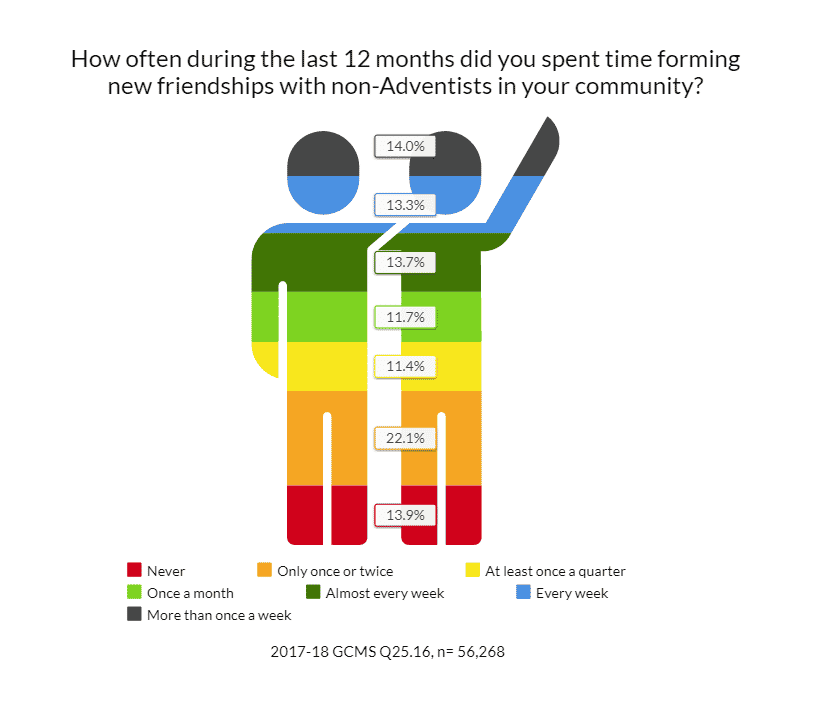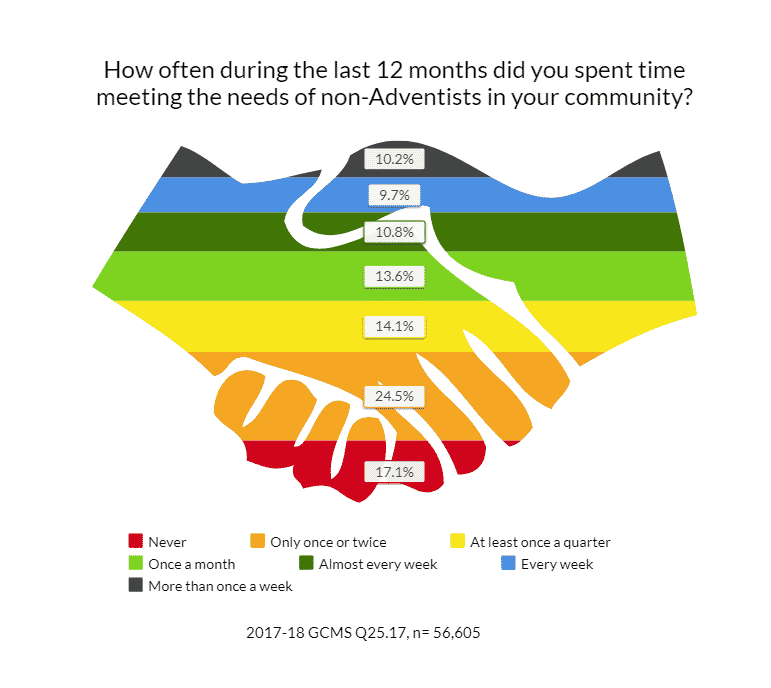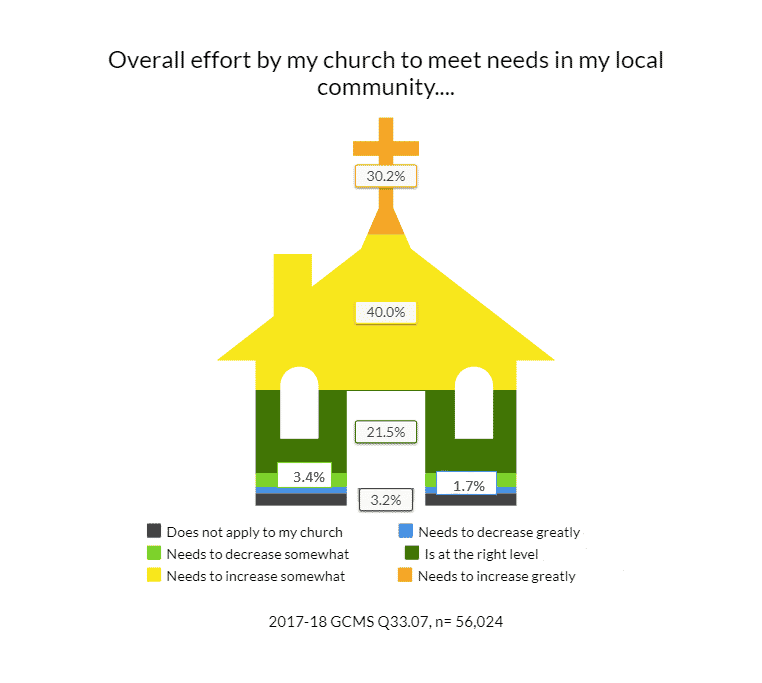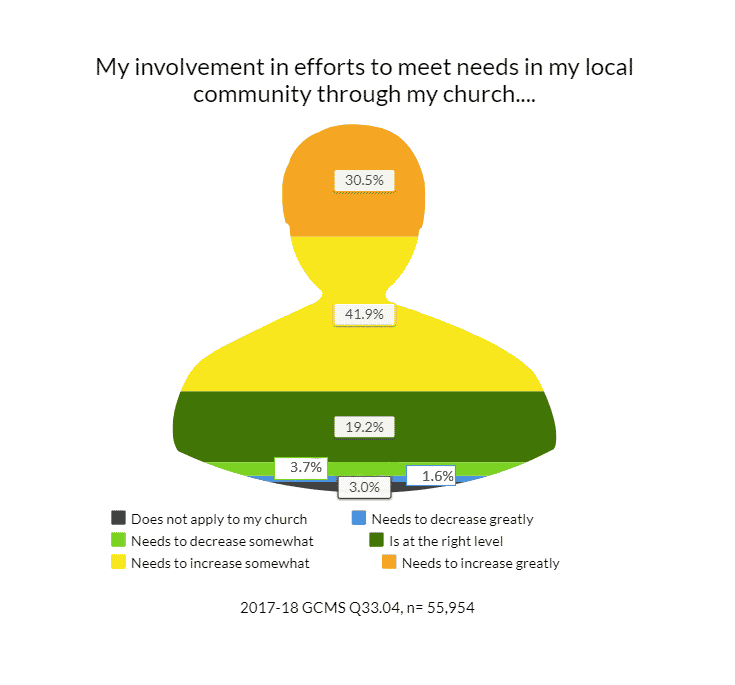In our last blog, we examined how members around the world perceived their church’s role and reputation in the local community and if they felt their local church had the ability to communicate effectively across cultures, clans, tribes, and religions. We discussed the importance of connecting with members of the community exactly where they are before bidding them to follow Christ. However, what does this look like when it comes to personal relationships?
The Global Church Member Survey 2017–18 (2017–18 GCMS) asked respondents to answer multiple questions about their interactions with people in the community and their honest views on their level of personal outreach activities. These results may surprise you!
Forming Non-Adventist Friendships
Participants in the 2017–18 GCMS were asked how often during the last 12 months they had spent time forming new friendships with non-Adventists in their communities. A little over a quarter (27%) of respondents reported doing so every week or more often; another 14% stated that in the last year, they had done so almost every week. It is worrisome, however, that 22% admitted that they had only spent time forming new friendships with non-Adventists once or twice in the last year (meaning that initial interactions likely had little to no follow-up), and 14% admitted never doing so. Thus, while 53% spent time with non-Adventists from once a month to several times a week, over a third (36%) had very limited or no connections with people outside the church. They possibly have friends in the church, are satisfied with these friendships, and do not feel a need or responsibility to reach out for new relationships with non-Adventists.

Meeting the Needs of Non-Adventists
When members were asked how often during the last 12 months they had spent time meeting the needs of non-Adventists in their community, the levels of involvement were even lower. One in five of the respondents said that they had done so every week or more often, with another 11% helping in their community almost every week. However, a quarter (the largest category) reported they had only done so once or twice in the last year; 17% admitted they had never spent time meeting the needs of non-Adventists in their community in the last year. These last categories constitute 42% of members rarely or never involved in community services.

While it is positive that some members are involved with forming friendships and/or meeting the needs of non-Adventists in the community, it is concerning that so many members reported rarely or never doing so. Forming authentic friendships is one of the best ways to find out people’s needs and meet them where they are. Only once you have gotten to know them and their needs can you truly lead them into a relationship with Christ (which, again, points to Christ’s method).
Personal Efforts to Become Involved in the Community
When members were asked if they felt the efforts of their church to meet the needs of the local community needed to change (increase or decrease) or was at the right level, nearly three-fourths (70%) of members felt the church’s involvement needed to increase. Only one in five (22%) of members felt their church’s efforts were at the right level.

When the question became more personal, asking members if their own involvement to meet the needs of the local community needed to change (increase or decrease) or was at the right level, a similar number (72%) of respondents admitted that they needed to increase their involvement to one degree or another. Again, about one in five (19%) felt their efforts were at the right level.

It is encouraging that members worldwide see the need for increased interaction in the community and/or with non-Adventists—both on a church level, as well as a personal one. There is a need to promote Christ’s method and friendship evangelism more in local churches. While pastors and other church leaders should teach members how to apply these methods, seek out opportunities for the church to have positive interactions with the local community, and foster relationships with those outside the Church, the responsibility does not fall solely on their shoulders. All it takes is one person who is willing to take a risk and engage in a new friendship—all for the sake of Christ.
Are you willing to take that risk?
For more research findings on the total sample, please see the Meta-Analysis report.
Created in collaboration with the Institute of Church Ministry
Published by ASTR on 07-27-2022
Image credit: Diverse group photo created by rawpixel.com – www.freepik.com

